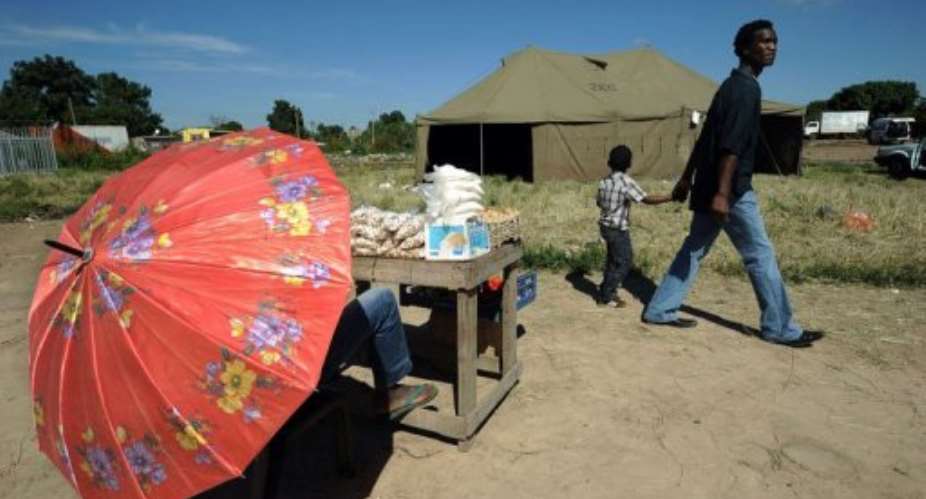HARARE (AFP) - Early results from Zimbabwe's constitutional referendum signalled widespread backing for laws to curb President Robert Mugabe's powers, though the vote count was marred by fresh political arrests on Sunday.
A preliminary count of around half a million votes showed more than 90 percent endorsed the new constitution, according to Prime Minister Morgan Tsvangirai's party.
The proposed text would introduce presidential term limits, beef up parliament's powers and pave the way for a general election to decide whether 89-year-old Mugabe stays in power.
Mugabe has ruled uninterrupted since the country's independence in 1980, despite a series of disputed and violent polls and a severe economic crash propelled by hyper-inflation.
Mugabe has backed the proposed constitution which, while curtailing his powers, would also allow him to remain in office for another decade until he is 99 -- elections permitting.
His political rival Tsvangirai has also lent his support to the text, but has voiced concerns that a continued crackdown by Mugabe's security apparatus could derail elections scheduled for July.
The latest sign of that intimidation came Sunday as plainclothes police detained four of Tsvangirai's senior aides.
Police confirmed the arrest of Thabani Mpofu, an advisor to Tsvangirai and three subordinates in the premier's office as well prominent human rights lawyer Beatrice Mtetwa.
"Today, this morning we arrested four people for impersonating the police," national police spokeswoman Charity Charamba told journalists.
"They are currently in police custody. We have also arrested Beatrice Mtewa for obstructing or defeating the course of justice."
Charamba said Mtetwa was arrested for shouting at police detectives raiding offices where part of the premier's documents are housed.
Zimbabwean police have launched a series of raids to seize two-way radios, a policy that rights groups say is a fig-leaf for intelligence gathering and intimidation.
A group of MDC supporters were also beaten up on Friday and a party leader was seized by plainclothes police on Saturday, the day of the referendum.
The Zimbabwe Electoral Commission said Sunday that at least two million people had cast their ballots in the referendum.
The full results are to be announced within five days of the vote.
The country has five million registered voters.
While casting his vote on Saturday, Mugabe, whom many blame for past unrest, urged Zimbabweans to ensure the referendum proceeded peacefully.
"You can't go about beating people on the streets, that's not allowed, we want peace in the country, peace, peace," he said.
Mugabe, the target of 11 years of Western sanctions over political violence and rights abuses, also used the opportunity to insist that the United States and European countries would not be allowed to monitor the upcoming general election.
"The Europeans and the Americans have imposed sanctions on us and we keep them out in the same way they keep us out," he said.
Tsvangirai on Saturday expressed hope that a positive outcome would help catapult the country out of a crisis marked by bloodshed and economic meltdown.
He said he wanted to see a transition "from a culture of impunity to a culture of constitutionalism."
The text would also strip away presidential immunity after leaving office, bolster the power of the courts, and set up a peace and reconciliation commission tasked with post-conflict justice and healing.
"A 'yes' vote is not a surprise because the constitution creates shorter terms for leaders," said 38-year-old Reuben Sibanda, a supporter of Mugabe's ZANU-PF.
"We need to retire the old man and allow a woman president to take over," he said.
In the run-up to the referendum, violence did not approach the levels seen in the disputed 2008 elections.
At least 180 people were killed then and 9,000 injured in a crisis that ultimately forced Mugabe and Tsvangirai into an uneasy power-sharing government.
But fears of a return to bloodshed remain ahead of this year's crucial polls.
"The situation will get more politically tense, but it won't be as violent as in 2008... because of the politics of inclusive government," said commentator Takura Zhangazha.
Tsvangirai has called on leaders from the regional Southern African Development Community (SADC) to meet for an urgent summit to help ensure the upcoming election is fair and free of violence and intimidation.
Observers worry there may not be enough time to apply all the necessary reforms to ensure a healthier political environment before the vote.





 Transport fares hike: GPRTU issue two-day ultimatum
Transport fares hike: GPRTU issue two-day ultimatum
 ARC endorses Alan as presidential candidate – Buaben Asamoa
ARC endorses Alan as presidential candidate – Buaben Asamoa
 Akufo-Addo appoints Kwasi Agyei as new Controller and Accountant-General
Akufo-Addo appoints Kwasi Agyei as new Controller and Accountant-General
 PNC dismiss reports of mass resignations
PNC dismiss reports of mass resignations
 PAC advocates for revenue collectors to be engaged on commission basis, not full...
PAC advocates for revenue collectors to be engaged on commission basis, not full...
 Akufo-Addo commissions Kumasi 1 Thermal Power Plant
Akufo-Addo commissions Kumasi 1 Thermal Power Plant
 Genser Energy commissions 110km of natural gas pipeline at Anwomaso
Genser Energy commissions 110km of natural gas pipeline at Anwomaso
 Naa Torshie calls for tolerance, peace ahead of 2024 election
Naa Torshie calls for tolerance, peace ahead of 2024 election
 Asantehene commends Matthew Opoku Prempeh for conceiving GENSER Kumasi Pipeline ...
Asantehene commends Matthew Opoku Prempeh for conceiving GENSER Kumasi Pipeline ...
 Let’s do away with ‘slash and burn politics’ in Ghana — Dr Adutwum
Let’s do away with ‘slash and burn politics’ in Ghana — Dr Adutwum
